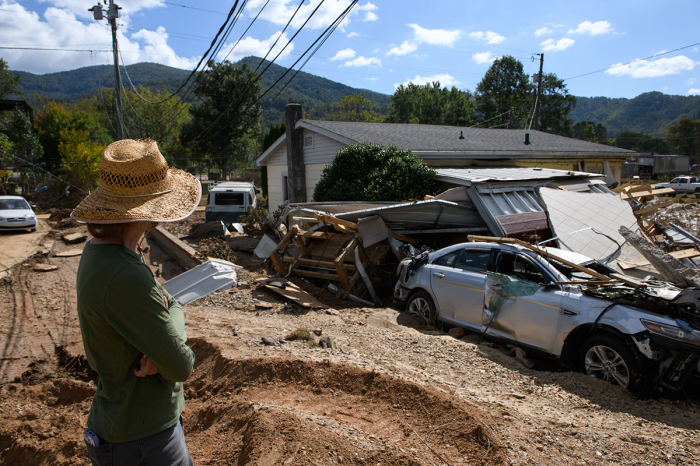Biden blames Hurricane Helene damage on 'climate crisis,' calls deniers 'brain-dead'
Major media, CBS debate moderators echo Biden

President Joe Biden, major media outlets and the CBS News moderators of Tuesday's vice presidential debate uncritically presented the recent Hurricane Helene that ravaged the southeastern United States as a consequence of climate change.
During a Wednesday briefing at the State Emergency Operations Center in Raleigh, North Carolina, Biden also condemned climate change deniers as "brain-dead."
Helene tore through a corridor extending from the Florida panhandle up into Appalachia last week. Even after diminishing to a tropical storm, the area around Asheville, North Carolina, in the western part of the state was hardest hit because the area had also suffered torrential downpours from a cold front the day before the storm hit.
After Helene arrived during the early morning hours last Friday, roughly four to five months of normal rainfall fell on the area in less than three days. Local rivers swelled to unprecedented levels, wiping entire towns such as tourist town Chimney Rock, southeast of Asheville, off the map. Communities in the region continue to struggle with no power or clean water nearly a week after the storm.
"Nobody can deny the impact of the climate crisis anymore — at least I hope they don't. They must be brain-dead if they do," Biden said during the briefing in Raleigh after surveying the damage in western North Carolina. "Scientists report that with warming oceans powering more intense rains, storms like Helene are getting stronger and stronger."
Biden: "Nobody can deny the impact of the climate crisis anymore, at least I hope they don't. They must be braindead if they do." pic.twitter.com/JzqrANS8Pw
— The Post Millennial (@TPostMillennial) October 2, 2024
Days after the destruction, multiple major media outlets began to attribute the hurricane's destruction to man-made climate change, with some suggesting that even inland mountainous regions often referred to by real estate researchers as "climate havens" are no longer safe.
"Deadly Asheville tragedy shows there are no climate change safe havens," read the headline from ABC News, which attributed the claim to experts.
In an article published Monday, The Washington Post described Helene as a hurricane "with the fingerprints of climate change," quoting North Carolina's state climatologist Kathie Dello, who told The Associated Press that former President Donald Trump was spreading "dangerous" misinformation about climate change in 2018, when she was a climate scientist at Oregon State University.
CNN ran an article titled "Asheville was called a climate haven. Helene shows nowhere is safe." CNN also quoted Dello, who told the outlet, "Canada has fires, Vermont floods, West Virginia has severe drought, there are heat issues in Phoenix. Where do you run from climate change?"
Dello was also featured in The Guardian, whose headline read: "Nowhere is safe," and added that "shattered Asheville shows stunning reach of climate crisis." The story claimed the storm's damage was "a stunning display of the climate crisis's unlimited reach in the United States."
The Guardian also quoted former Vice President Al Gore as saying Helene exhibited "a staggering and horrific reminder of the ways that the climate crisis can turbocharge extreme weather."
NBC News maintained that "the devastation in western North Carolina is a result of a combination of factors related to climate change and the terrain," but also noted that Helene's unusual destruction was compounded by the fact the region received heavy rains the day before the tropical storm moved in.
NPR reported in a Wednesday article that the damage was a result of human-caused climate change, and implied the destruction is a result of unheeded warnings from climate scientists.
"The catastrophic damage is a sign of what climate scientists have been warning about: as the Earth heats up, rainfall is becoming increasingly extreme and deadly. And torrential rain can occur anywhere, including far from coastlines," the article said.
"As humans add more heat-trapping emissions to the atmosphere, temperatures are getting hotter. Warmer air is able to hold more water vapor, meaning that storms have more potential rainfall to release," the article later said.
During the vice presidential debate between Minnesota Gov. Tim Walz and Sen. J.D. Vance, R-Ohio, on Tuesday, CBS News moderators Norah O'Donnell and Margaret Brennan also brought up the hurricane, which they attributed to climate change and used to pivot to a question about what steps each candidate would take to reduce it.
"Scientists say climate change makes these hurricanes larger, stronger, and more deadly because of the historic rainfall," O'Donnell said.
????Norah O'Donnell says, “Scientists say climate change makes these hurricanes larger, stronger, and more deadly because of the historic rainfall.”
— Tyler O'Neil (@Tyler2ONeil) October 2, 2024
No, this is a debatable point, and the increased temperatures that presumably would come from burning fossil fuels should lead to… pic.twitter.com/tfmYmYH2hX
Vance replied by focusing on the human toll of the hurricane and stressing that the residents in storm-ravaged communities need "as robust and aggressive of a federal response as we can get, to save as many lives as possible."
Many suffering residents in the Asheville area continue to reel from the carnage, and thousands have been turning to their local churches for the basic supplies that have been donated from out of state.
Earlier this week, The Christian Post reported that First Baptist Church in Hendersonville, which is about 25 miles south of Asheville, ministered to roughly a third of the town's population in one day.
Kristi Brown, a volunteer working at the church, told CP that residents had no time to wait on state and federal aid, and took the situation into their own hands to help their neighbors.
Jon Brown is a reporter for The Christian Post. Send news tips to jon.brown@christianpost.com





























